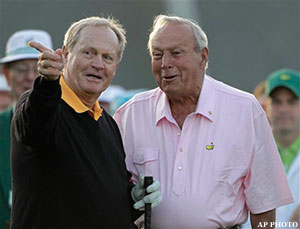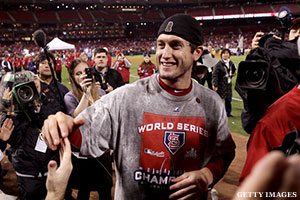By Jeff Neuman
RealClearSports
It's the ultimate question in sports. It's arguably the reason sports exist in the first place.
What makes a winner?

Who can stand up to pressure? Who has the guts? Whom would we want to have as our warrior, our representative in single combat for the fate of our families, our city-state, our country?
At a recent press conference, two of the finest commentators the world of fun and games has ever known kicked around the question of what sets a winner apart.
DAN JENKINS: I believe that the athletic heart can transfer eras. It can move from one decade to the other. You don't know what's inside -- [Lee] Trevino said this better than anybody. You never know what's in a guy's heart. How big a winner is he going to be? I don't know because I don't know what's in his heart ... . The great champions are those who absolutely despise the idea of losing, and I think that's what Ben Hogan had. I think that's what Arnold [Palmer] had. Jack [Nicklaus] certainly had it.
PETER ALLISS: I think Billie Jean King summed it up at this year's Wimbledon talking about great players, and she said, the nearly players are frightened of winning and the great players are frightened of losing, and that summed it up.
There's a very useful Latin phrase that encapsulates this philosophy neatly.
Post hoc, ergo propter hoc.
Loosely translated for this context: Tell me who won, and I'll tell you who's a winner.
Character doesn't determine who's a winner. Heart doesn't determine who's a winner.
Results do. And then we assign character and heart, because they're more satisfying explanations than talent and circumstance and luck.
Jack Nicklaus won 18 professional majors because he absolutely despised losing? He finished second 19 times because ... someone else despised losing more on those days? Because he didn't despise it quite so much on those occasions? Because he was the best freakin' golfer on the planet, and sometimes you win and sometimes you lose?

Dirk Nowitzki was a loser who disappeared at important moments, until he became a winner who rises in the clutch. LeBron James will be a loser until he wins, no matter how many games he has to win to get into a position to lose the big one in the first place.
Pete Rose played in more winning games than any other athlete, or so he claims. Show of hands: Does anyone want to say this means something about his character? Anybody?
Tiger Woods was a winner, about as big a winner as we've ever known, until he became a loser, crashing as surely and abruptly as Britney Spears or Lindsay Lohan or Icarus. Did his character change, or was it never about that in the first place? (Jenkins has an answer: "I frankly don't know that Tiger Woods has it or not because he's never had to come from behind. Every major he won, he was in front, and everybody else, most of them dropped dead. So we'll see." So it's possible to win 14 majors without being a great champion or having great heart. Gotcha. I'll stay tuned.)
The question of "winners" is symbolic of the great schism in today's sports analysis, between Old School and New, stethoscope and calculator, character and sample size. One side looks to the heavens and sees archers and lions and bears; the other disassembles the watch to understand what makes it tick.
I cringe when I see the actual results of games dismissed as "small sample size," as though the analysis matters more than what happened. Athletes are not lab rats, and sports are not governed by natural laws we can determine through study and repetition. A lot of different hitters could have had a 1.160 OPS in last year’s World Series; David Freese and Mike Napoli did. That doesn’t mean Freese and Napoli are great hitters. It does mean they were, during the eight days when their sport determined a championship.
We're in an age of overcorrection. For a hundred years, since Frank Merriwell was created in the image of Horatio Alger, we’ve treated sports as a metaphor for an idealized society in which virtue is rewarded with victory, and vice goes down to defeat.

Today, thanks to Bill James and Billy Beane and Gil Brandt and less skillful interpreters who followed them, we're as likely to view the games as providing discrete but skewed bits of data that we will understand better by translating into a neutralized context.
As nearly always, the truth lies somewhere in between. We know it's possible -- maybe even easier -- to win without honor. And understanding all the complexities and variables can make it all the more delicious when something contrarian happens, as it will.
The purpose of science is to understand what will happen by thorough examination of what has happened. But the purpose of sports is to entertain, something it does best when it provides a way for us to identify with the participants, often by making heroes of them whether they deserve it or not.
Besides, as Tom Waits put it, every one of us is a winner, because we are all the product of that one sperm that beat out 250 million others to get to the egg.
That really took character.
-- Jeff Neuman's columns for RealClearSports appear on Monday and Thursday. Follow him on Twitter @NeumanJeff. His collected golf writing and blogging can be found at www.neumanprose.com.
More From RealClearSports
-- Nadal Poised To Claim 7th French Crown
-- German Soccer Ready To Reclaim Greatness
-- Sports People On Court, Not In Court
-- Top 10 Most Dominant Postseasons
Popular Stories On ThePostGame:
-- Which Sports Conspiracy Theory Can You Believe?
-- 'Juice' Survives The Streets To Become Marlins' Barber To The Stars
-- The Exercise That Makes Body Fat Disappear
-- 3 New P90X Exercises That Blast Fat








